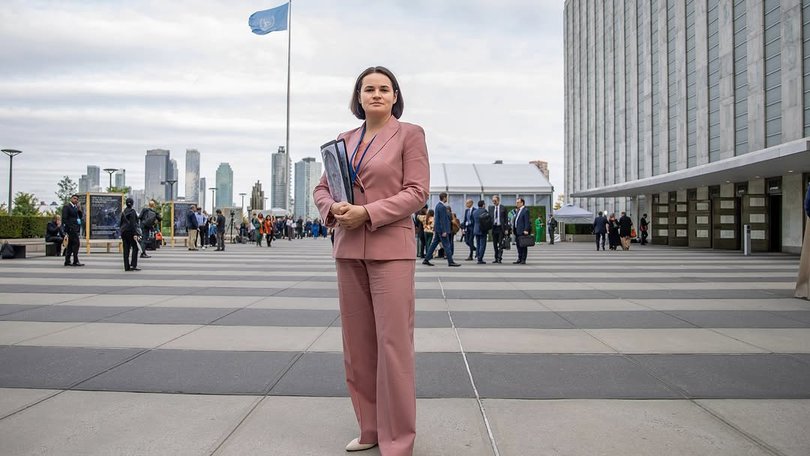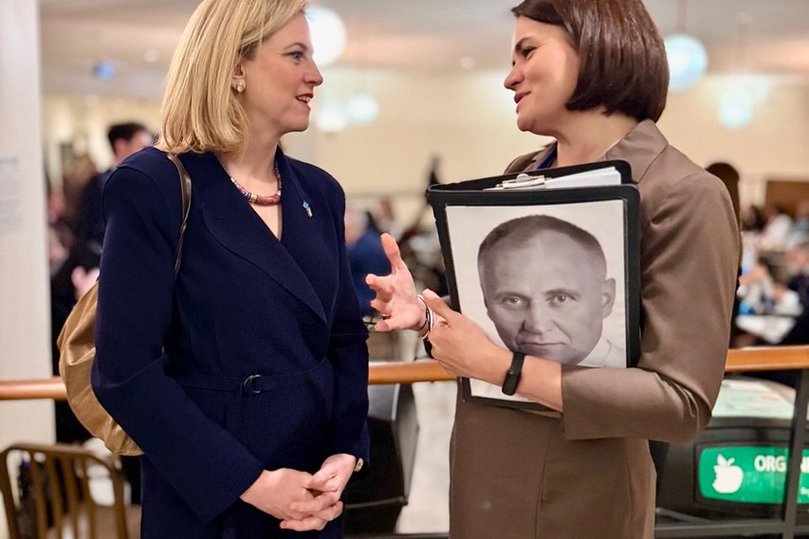Svitlana Tsikhanouskaya: Belarus’ leader in exile tells Australia ‘freedom is not a privilege’ ahead of visit
Forced into exile after an election she was widely regarded to have won, Svitlana Tsikhanouskaya has a message for Australians ahead of her visit Down Under next week.

In 2020, 38-year-old Svitlana Tsikhanouskaya’s husband was arrested, she ran for the Presidency of Belarus in his place despite having no political experience. She was detained and forced into exile after an election that she was widely regarded to have won but was rigged in favour of her opponent, a puppet of Russian President Vladimir Putin.
Five years later, the 43-year-old is making her first visit to Australia with a simple message.
“Cherish your freedom, cherish your democracy. It is so easy to lose — and so hard to win back. We Belarusians know this from our own history,” Ms Tsikhanouskaya told The Nightly, in her only interview with Australian media ahead of her trip to Canberra, Sydney and Melbourne beginning next week.
Sign up to The Nightly's newsletters.
Get the first look at the digital newspaper, curated daily stories and breaking headlines delivered to your inbox.
By continuing you agree to our Terms and Privacy Policy.“I also want Australians to remember that the fight for freedom is a global one. If tyranny is not stopped, it spreads. We see this clearly in our region — with Russia’s aggression and its grip on Belarus.
“Our shared goal must be to stop tyranny wherever it appears, and to work together to make the world freer and more peaceful.
“Democracy is never ‘someone else’s problem.’ When one nation is crushed by tyranny, others become less safe.”
Svitlana Tsikhanouskaya said that after touching down in Australia, her first task would be to thank the country for imposing sanctions on Belarus in response to its support for Russia’s invasion of Ukraine.
But she will urge the Australian government and people to do more to support both Belarus and Ukraine, saying the two countries’ fates were intertwined.
“Freedom is not a privilege — it is a shared responsibility. Every act of solidarity, including from people here in Australia, brings us one step closer to freedom,” she said.
“I want to show Australians how people are paying for freedom, with suffering, with tears, with pain.
“Our nation stood up for freedom, and they are paying a huge price for it.
“Freedom is like air, you don’t feel it until you start suffocating because of the lack of it.”
Chain of evil
She said that the alliances being forged by authoritarian leaders since the war in Ukraine was a “chain of evil” circling the planet.
She said in this way Belarusians and Ukrainians were not just fighting for pieces of land but against “world evil.”
“And every nation, every free society has to join this fight because tyranny or dictatorship is like cancer,” she said.
“If it’s not cut to every last cell it will continue to grow.”
Belarus is a landlocked country in eastern Europe bordering Russia, Poland, Ukraine, Latvia and Lithuania.
It gained independence in 1991 following the fall of the Soviet Union, but unlike Poland and its Baltic neighbours, it did not follow a pro-European path.
Its only leader, Alexander Lukashenko, has adopted authoritarian rule, crushing freedom of speech and political opposition. According to Human Rights Watch, more than 1000 political prisoners remain behind bars in Belarus.
Mr Lukashenko is viewed as a puppet of Russian President Vladimir Putin. He allowed Belarus to be used as a launchpad for Russia to attack Ukraine and target Kyiv at the start of the full-scale invasion.
For this reason, many Ukrainians refer to the Belarusian border as “Russian.”
Release of husband a moment of huge happiness, but also struggle
If 2020 was an explosive year in Ms Tsikhanouskaya’s life, 2025 is proving to be another.
Earlier this year, President Donald Trump eased some sanctions that the US imposed on Belarus after the start of the Ukraine war as part of a deal to secure Ms Tsikhanouskaya’s husband Siarhei Tsikhanouski from jail.
Mr Tsikhanouski, a pro-democracy activist, built his profile blogging and on YouTube. He was arrested days after he said he intended to run against Mr Lukashenko in 2020.
This is when Ms Tsikhanouskaya, until then a teacher and mother of two, entered politics.
She ran in her husband’s name, campaigning for free and fair elections, the release of political prisoners and term limits on the presidency. She promised to exit politics as soon as these reforms were implemented.
Mr Lukashenko allowed her to run, believing the Belarusian people would never see a woman as legitimate. That move backfired as the public warmed to their “accidental candidate”, who was likened to a Belarusian Joan of Arc. The 2020 elections were viewed as illegitimate by the international community when Ms Tsikhanouskaya officially received just 10 per cent of the vote.
The result was also one of great danger for her and her children. She was detained and only eventually freed when she agreed to live in exile in Lithuania. The Lithuanian government recognises Ms Tsikhanouskaya as Belarus’ legitimately elected President.
There she continued campaigning for Belarusian democracy and travelled the world to rally international support for her country. One of her trademark actions was to carry a folder containing her documents, which also bore her husband’s image on the back, ensuring his face would also feature in photographs of her.

When Mr Tsikhanouski was released from prison after five years, he was unrecognisable to their children.
Asked how she was managing being reunited after such a long time with no contact, she said it was a moment of “huge happiness” but that it was also challenging.
“Honestly speaking, we are learning to be a family together because five years of silence with no letters or phone calls — it was a real challenge for our children and for both of us,” she said.
“Our children are getting to know their father - not through photos or stories but in real life, but it’s not easy for Siarhei.
“Although he is not broken, mentally, prison leaves deep marks, physically as well. Siarhei is still recovering and at the same time, he immediately returned to what he has always done — speaking the truth, helping others, staying involved.”
She said that being together again had given them both new strength to continue their fight for their country’s freedom and for all the families who remained “torn apart by repression.”
But she said another challenge was the “emotional gap” caused by the “deprivation” of sharing the gruelling journey of the 2020 election rallies and the Ukraine war.
“My husband missed the beginning of the war, so it was like a short message in prison: ‘the war has started’,” she said.
“But he didn’t feel how cruise missiles had been launched on our country, he didn’t see Bucha and the murders on the streets,” she said, referring to the massacre of Ukrainian cities at Bucha, outside Kyiv, in the early days of the full-scale invasion in 2022.
“We went through all these events emotionally, and political prisoners were deprived of this possibility, so they have to catch all this information and all those emotions afterwards.
“And it’s rather difficult to do, and it definitely will take time.”
Belarus and Australia’s shared history
One of Ms Tsikhanouskaya’s first engagements in Australia will be to visit memorial sites to honour the ANZACs.
Filmmaker Alex Spektor estimated in his documentary ANZACs from Russia: The Untold Story that around 1000 Russians fought alongside the ANZACs in the First World War, when the Russian Empire under the Tsar was allied with the British.
Of those, hundreds were Belarusians, including Norman Myer, who came to Australia with the help of his uncle Sidney Myer, founder of the giant Australian department store chain which still bears the family name.
“These Belarusians who fought for the ANZAC forces fought for your freedom and ours,” Ms Tsikhanouskaya said.
“It is a little-known chapter, but one worth remembering. We may be far apart geographically, but we share a common history.”
While in Australia, she will give a series of lectures in Melbourne and Sydney, as well as at the Australian Strategic Policy Institute in Canberra.
She has meetings confirmed with Foreign Minister Penny Wong, but not yet with Prime Minister Anthony Albanese, whom she has asked to meet.
She said it was important that solidarity be shown at the highest levels of government in Australia.
“Because these meetings will be strong messages of solidarity to Belarus but also to Ukraine as we all fight for freedom, democracy and human rights,” she said.
She said there was much Australia could do to continue supporting Belarus and Ukraine.
This included increasing support to Ukraine. Under Mr Albanese’s government, Australia has not committed any new military aid to Ukraine for more than a year.
She said Australia could also play a role in opening cases in the International Court of Justice and the International Criminal Court to hold dictators and the perpetrators of war crimes to account.
She said that Australia and New Zealand could also join the ten other countries that are backing her International Humanitarian Fund for Victims of Repression, which supports victims of Mr Lukashenko’s regime, including with aid, medical help, rehabilitation, relocation and counselling.
Margaret Twomey, who served as Australia’s non-resident Ambassador to Belarus, as well as to Ukraine and in Russia, told The Nightly that Russia had long held a grip on Belarus.
“Our sanctions against Belarus and the fact we - including Foreign Minister Penny Wong - are giving Svitlana a platform are realistically the best form of support we can give,” Ms Twomey said.
“Her ‘cherish your freedom’ point is well made and one most Australians could do well to ponder.
“The rise of authoritarianism in Europe is something we should be paying more attention to - including through our academic institutions, which aren’t giving Europe the attention it merits.”

